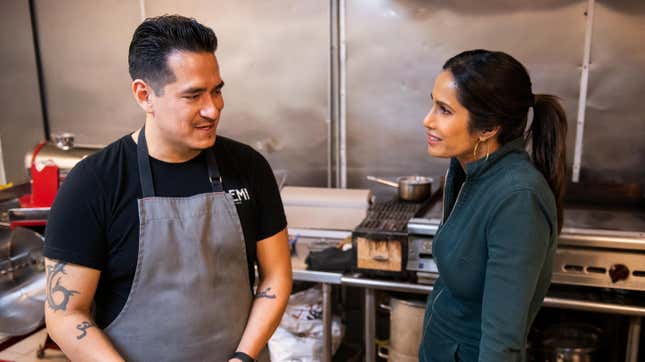
It’s no wonder that the best American food shows are those that whisk hosts off to other countries. It’s there, not in the States, that they can actually investigate the culinary traditions that form the amorphous patchwork of American cuisine, which is defined primarily by how it’s adopted the recipes and techniques of other cultures. Lacking the contributions of immigrants, what’s left? Donald Trump summed it up best, perhaps, when he served the Clemson University football team a buffet of Big Macs, dubbing it “great American food.”
Taste The Nation, a new food travel show from Hulu, directly engages with this notion, asking point-blank just what, exactly, American food is. By focusing specifically on the immigrant groups that have seen their native dishes appropriated, as well as the ways in which they seek to preserve those original traditions, it inches toward an answer more complex than “fast food.” Episodes dig into the evolutions of Japanese cuisine in Honolulu, Persian fare in Los Angeles, and burritos in the border city of El Paso, and while some old traditions are seeing a back-to-basics resurgence in the U.S., others, like those of the Gullah Geechee in Charleston, South Carolina, are working to keep them alive in their own communities.
Top Chef judge Padma Lakshmi, a first-generation Indian immigrant, is a smart and fitting host, her love for the food of her homeland having been shaped as much by her upbringing in New York City as her mother’s cooking. That dynamic results in one of Taste The Nation’s best episodes, “Don’t Mind If I Dosa,” which digs into the Indian fare of Queens’ Jackson Heights neighborhood as Lakshmi shares a kitchen with both her childhood hero, Indian cooking show host Madhur Jaffrey, and her daughter, who she’s trying to raise with a balanced knowledge of both American and Indian culture. It’s a lot for a half hour perhaps, but it situates Taste The Nation as a show that’s as much about cultural identity as it is food.
This mode of culinary storytelling isn’t new—Anthony Bourdain’s Parts Unknown, Samin Nosrat’s Salt Fat Acid Heat, and David Chang’s Ugly Delicious have all interrogated what food and cooking can tell us about culture and our own worldview. But while Taste The Nation is somewhat slicker in presentation than those shows, it benefits from its hyper-focus. As Lakshmi chats and cooks with locals, she’s often met with stories of how American and European ingredients fundamentally altered the diets of these communities. In an affecting episode about indigenous populations, a local helps unpack the painful history of fry bread, a traditional Native American dish that was born from ingredients that were “basically forced upon” them by the U.S. government. In many instances throughout the series, food is both a communal comfort and a gateway into the more painful aspects of assimilation.

Lakshmi proves an amiable guide through the episodes, even if her years of hosting have shaven off some of her rough edges—her post-bite reactions are often best described as “Food Network-y.” And your mileage may vary from episode to episode, as the Germanic origins of hot dogs and lagers don’t stir the soul quite so much as Lakshmi’s own connection to Indian dosas or a Mexican cook’s complex relationship with the Trump-supporting owner of their El Paso diner.
But there’s nevertheless something vital about the show’s approach. The premiere opens with a supercut of Lakshmi’s interviews being interrupted by helicopters patrolling the Southern border—one local describes it as the “constant border sound of a community under surveillance.” It’s a sobering reminder of our xenophobic government, the relentless handwringing over “caravans,” and the simple fact that so much of America still lives in fear of immigrants, despite our dinner tables having been forever altered by their influence.